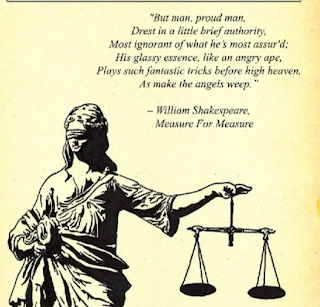Measure for Measure deals with the consequences of an
imperfect judicial system. Problems arise when Claudio has consensual intercourse
with his fiance, Juliet, and is imprisoned and sentenced to execution as a consequence.
The law is depicted as random and harsh, possibly because Claudio’s crime was
something Shakespeare himself was guilty of with Anne Hathaway. The play centers
around the harsh imprisonment of Claudio and the even more depraved actions of
Claudio’s judge, Angelo, who offers Claudio freedom only if his sister,
Isabella, will sleep with him. Angelo’s hypocrisy is an important theme of Measure for Measure. Can there really be
justice in society run by humans? By looking at a comparison to Greek mythology
Isabella makes in Act III, it’s clear Shakespeare had little faith in an ideal judicial
system, but did have faith in mercy.
The comparison Isabella makes in Measure for Measure is between man and giants. Giants from Greek
mythology were a mixture of heaven and earth and were creatures fallen from
heaven. Shakespeare was comparing giants to man who are often seen as fallen,
but with a portion of the divine. When Isabella first mentions giants she is
speaking to Angelo, trying to convince him to have mercy on her brother. She
says “O, it is excellent
to have a giant’s strength, but it is tyrannous to use it like a giant.” In
other words, the law gives you power, but to exercise it unjustly is to be like
the giants: foolish and base. The giants of Greek mythology were beast-like, despite
their divine heritage. In one of Isabella’s most powerful speeches she compares
man to the apes, angry and rash, while the God’s weep over mankind’s poor
choices.
Though the ideal
punishments should be proportional to the crime and the criminal, when man is endowed with heavenly power, they are often unable
to deal justly. Angelo and to an extent, the Duke, represent this power and the
flaws of the ensuing system. Since true justice is an ideal impossible to
humanity, mercy makes up the difference. Like when you post your blog super
late, but your professor is merciful. If I were to research this topic further,
I would study Greek mythology and how it was perceived in Shakespeare’s day in
terms of justice and mercy.

















